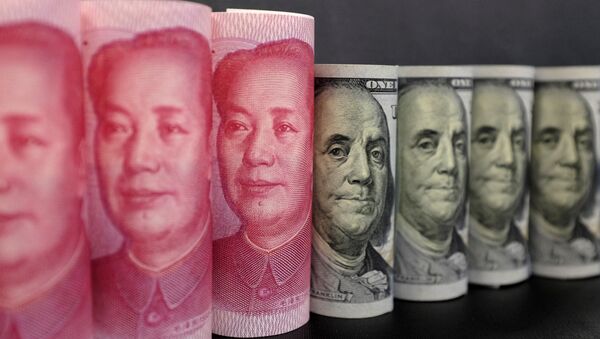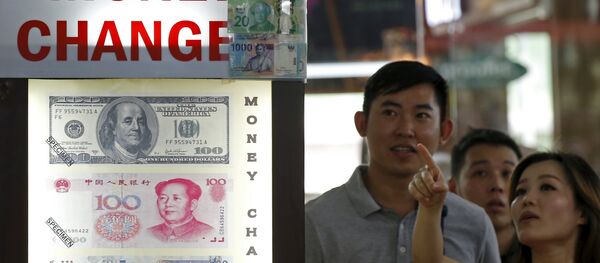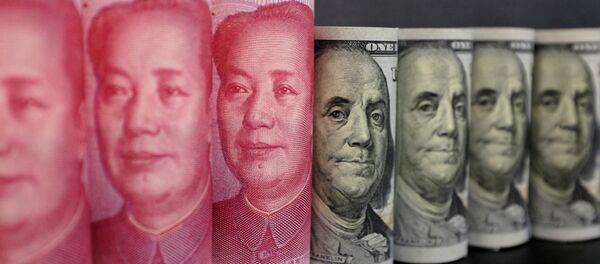The launch of oil futures denominated in yuan is an important step toward the internationalization of the Chinese currency, Cheng Fengying, research fellow at the World Economy Institute of the China Institutes of Contemporary International Relations (CICIR), told Sputnik.
"Now is just the right moment: Oil prices are low, supply exceeds demand and China is the largest consumer of oil," Cheng highlighted speaking to Sputnik China. "If we do not set the payments in yuan now, we will not learn how to influence prices and when the market situation changes and demand exceeds supply, we will be in a losing position."
According to Cheng, the process of internationalization of the yuan "could be compared to the boundless ocean": "It all depends on our ability to swim and take risks. We are prepared for risks. For example, a committee under the People's Republic of China (PRC) State Council to oversee financial stability and development was set up [on Wednesday]."
The official statement quoted by Xinhua News Agency reads that the Committee "will be tasked with deliberating major reform and development programs for the financial sector, coordinating financial reform, development and regulation, coordinating issues concerning monetary policy, and coordinating the making of financial policies and related fiscal and industrial policies."
What is the Major Advantage of China's Oil Futures Being Priced in Yuan?
Wang Zhimin, director of the Center for Globalization and Modernization at China's Institute of Foreign Economy and Trade, regards the possibility of converting futures into gold as a competitive advantage over Brent and West Texas Intermediate (WTI) benchmarks.
"Settlements in renminbi will be convenient, because the 'petro-yuan' can then be converted into gold," Wang told Sputnik. "It is very good. After all, the Bretton Woods system was supposed to be tied to gold. Although [the dollar's convertibility into gold] was suspended [in 1971], gold still remains a solid commodity."
Wang noted that some countries, such as Russia, have already agreed to trade oil with China in yuan. He believes that gold-backed futures contracts will attract even more attention from global players.
While Russia has been receiving payments in yuan for oil supplies to China since June 2017, Venezuela has also jumped at the opportunity to nominate oil prices in the Chinese currency. The logic behind the move is clear: It is advantageous for some countries subjected to US sanctions to avoid transactions in dollars. All these countries — Russia, Iran and Venezuela — are major suppliers of crude.
Wang believes that even Saudi Arabia, which has been trading hydrocarbons in US dollars since the 1970s, as a result of an agreement struck by the Gulf monarchy and its neighbors with then President Richard Nixon, may soon switch to the yuan.
"The US will import less and less oil due to its 'shale revolution' while Chinese imports will not decline, on the contrary, it will grow," the Chinese scholar emphasized. "The number of cars [in China] will increase, the economy will develop, and energy consumption will grow. Therefore, it is not in Saudi Arabia's interest to lose the Chinese market."
Furthermore, in September 2017, the China Daily noted that "Saudi Arabia is willing to consider funding itself in Chinese yuan." According to the media outlet, "obtaining some funds in Chinese yuan will diversify Saudi Arabia's financing channels after it borrowed tens of billions of US dollars overseas last year."
In October, CNBC reported, citing Carl Weinberg, chief economist and managing director at High Frequency Economics that the Chinese may "compel" Riyadh to shift to yuan pricing of oil. The media outlet added that Saudi Arabia currently remains "at the crux of the petrodollar."
"Moving oil trade out of dollars into yuan will take right now between $600 billion and $800 billion worth of transactions out of the dollar," Weinberg estimated, as quoted by the media outlet.
China's decision to price crude in yuan using gold-backed futures is aimed at "dethroning" the dollar, Sri Jegarajah of CNBC wrote on October 24.
The journalist cited Gal Luft, co-director of the Institute for the Analysis of Global Security, a Washington-based think tank focused on energy security, who stressed that although the move has not become a "game changer" yet, it "is another indicator of the beginning of the glacial… decline of the dollar."







